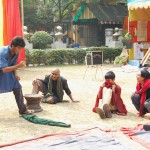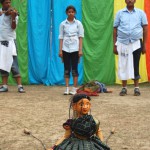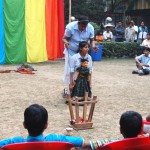Hindi Theatre Street Performance Day One
New Market
As soon as we arrived at Simpark in New Market and began setting up the banners and props, the two security guards present came up to us and ordered us to seek permission before performing in that space. The Seagull representative who was with us argued that they had put up a similar performance in the same space before, and had been given permission that time. The guards, in their self-importance, refused to change their stand. While he went to get permission, a decision was taken to start the performance. All this activity had already attracted a certain number of curious peo- ple to the spot. I had been thinking that it was not exactly the start that the performers would have wanted, but then I saw the other side of it. Curiosity had been aroused, and it had probably ‘woken up’ the actors too, albeit in the funniest of ways. They handled it all with aplomb, not getting nervous or frustrated. As soon as the boundary rope marked the performance space, more people started coming. New Market’s sheen has suppos- edly been taken away by the shopping malls. In my opinion, it was not quite so. The audience we were had was not one that we would see everywhere. Among the slowly increasing crowd of people, there were school students, street vendors and even some foreigners.
It was the perfect audience for a first per- formance. To their credit, the actors were loud and clear, which made sure that they were heard in the open space and people could follow what was going on. There was even someone taking videos of the performance on his small camera. As I looked around, I noticed that the audience was primarily male. There was however one woman who seemed to be the most interested member of the audience. Her home was probably down the street, and she was carrying her baby in her arms. When she saw the scene in which traffic is stopped and little street urchins come and beg at car windows, she identified with it, getting excited and pointing it out to someone behind her, calling her to come and see.
There were also some (very few) who found the performance quite amusing. I could not tell if it were the dolls or if it was the acting. Sadly, they just seemed to be watching for the sake of it. Most people however seemed to be interested in what the actors had to say. The foreigners watched out of curiosity but they probably did not understand what was happening. Behind me, someone called a friend on her cell phone to tell her about it. Others asked questions to the workshop conductor, such as which school the participants were from. There were also some cynics. I asked someone standing next to me what he thought about the show, and he replied saying that it was obvious that the children still needed training. To jump to their defense, I told him that they were still all school students and amateurs. This kind of curiosity and responsiveness pervaded audience reaction throughout.
At the end, the performers were given a rousing applause. Most had stayed to watch the whole performance, and hung around even after, to offer congratulations, ask questions, or just to see what was going to happen next. As we all started leaving and people realized that the show was over, the crowd slowly thinned and people went back to their own business. It had been a good start.
Ashutosh College
This setting—the front of Ashutosh College, did not quite seem ideal from the start. The few students who were hanging around there were not very interested. The space was too small, and was too close to the main road, so the sounds of the buses were bound to drown out the actors’ voices. It was a space where one could not concentrate effectively. Once again, there were a few curious people, but it was not the same as New Market. A very telling moment was when a disabled man (he was on crutches) walked away as the character branded ‘mentally disabled’ in the play was performing his monologue. Incidentally, he too walked with a limp.
This time around, the performance itself was just a little bit lackluster, because it did not have the energy of the previous performance. But it was the surroundings and the response which contributed to the overall average showing. The buses did drown a lot of the dialogues, as passengers looked out of their windows at the performance as they rumbled past. The students watched, but only because they had been requested to. Towards the end, many of them moved away. There were also two schoolboys who stopped to watch. One of them wanted to stay, but his friend did not. Eventually though, the former got his way, and they did stay on. Most people stayed out of only a passing curiosity, unlike at New Market. They watched for a while, and then left. Only a few stayed till the end, and offered a polite applause.
As we walked back to the bus, the tiredness and the disappointment showed on the par- ticipants’ faces, the conductor was not happy, and we all hoped for a better performance at the next stop.
Jadavpur University
When we walked into the Jadavpur University campus, the Bengali play was being performed. There was some interest, mostly from the students sitting on the steps of the ‘quad’, which the actors were facing. One would have expected more interest since the play was about the different forms of academic pressures faced by school students. One of the leading participants reminded the audience of this fact after the performance was over. When he enquired whether they liked it, scattered ‘yes’s’ were heard.
The start of the Hindi play, however, attracted a few more people. This was probably because of the loud, direct beginning (cries of ‘suno suno’, which means ‘listen listen’) and the fact that the actors were very audible this time. As the play progressed, the stairs filled up, as did some of the surrounding space. Although not as large a crowd as in New Market, it was attentive. Since they were students, some probably even studying issues like human rights, I think that they understood the issues more deeply than the other audiences we had encountered. But I could be wrong.
In the background, some carried on with other ‘student’ activities. Some, I realized, had come all the way from the student canteen to see what was going on. One person, however, marveled aloud at how attentively people were watching the performance. “Eta putul khela” (this is a mere puppet show)” he remarked, not seeing the point. But this was, overall, a better performance than the previous one. The mood of the ‘posse’ was upbeat again as we walked back to the bus, geared up for the next performance.
South City Mall
At South City Mall too, we ran into the Bengali theatre group in the middle of their performance. Although radically different from the atmosphere at all our other stops, there was obviously something missing here. There were too many distractions in an expansive (both vertically and horizontally) mall like this; too many things to ‘peak’ into and then pass by, that the performance also became just another addition to window-shopping. There were very few people actually standing and watching. It wasn’t much different when the Hindi play began. Once again though, I noticed that a few more people trickled into the audience ‘space’ as it started. There were even a few who followed carefully what was being performed. Many watched as they came down the escalators and from the balconies on every floor level, although I doubt if they were able to get a grasp on the play at all. They were probably content simply with watching the actions from above.However, the performance itself was up to the mark, and the actors had every reason to feel proud of themselves. Their show did attract some applause from those who were present.
The giant plasma screen was also showing the one-minute videos made by the participants of the PeaceWorks film workshop as the plays were being performed at the ground level. Sadly, no one seemed to even glance at those. Maybe they thought that they were just some of the many advertisements that were aired repeatedly on that screen. It wasn’t the end of the long day yet. Some of the participants were going to go on air to speak to the radio jockey of the channel ‘Meow FM’. Though exhausted it was a fruitful day.
— A report by Shamoni Sarkar
PeaceWorks intern





